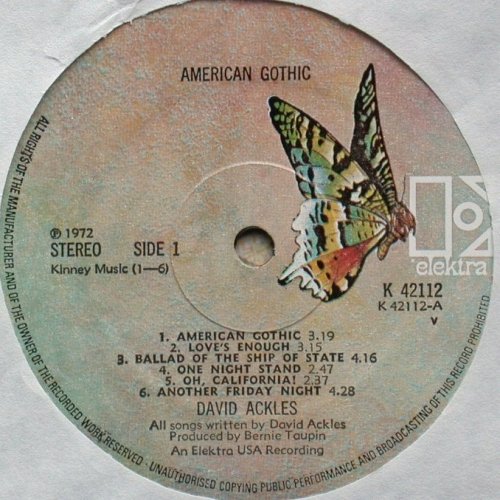 I’m back. I’m sorry for my absence, but my move from NJ to RI was a massive undertaking. Then when I got here I couldn’t get my turntable to work probably. Everything seems to be sorted out now, so look for Cratedigger every other Saturday, same as it’s always been.
I’m back. I’m sorry for my absence, but my move from NJ to RI was a massive undertaking. Then when I got here I couldn’t get my turntable to work probably. Everything seems to be sorted out now, so look for Cratedigger every other Saturday, same as it’s always been.
David Ackles only made a total of four albums, between 1968 and 1973. Fellow songwriters Elton John and Elvis Costello wonder why his music is not more well known. Costello once described the lack of recognition as a “mystery.” He also and made sure to credit Ackles as one of his major influences in his Rock and Roll Hall of Fame induction speech in 2003. Perhaps Ackles’ music, a product of the combined influence of Broadway show tunes, Jacques Brel, Brecht and Weill, the English music hall, and the nascent Southern California singer/songwriter movement, weren’t trendy enough.
Ackles started his songwriting career as a staff writer for Elektra Records, but his songs were so unique and idiosyncratic that they just didn’t work for other artists. The legendary Elektra boss Jac Holzman suggested that Ackles make his own albums, and his self-titled debut was released by the label in 1968. The release met with critical success, but little public acknowledgement, and a second album, 1970’s Subway to the Country, met the same fate.
The third David Ackles album, and by far his best known, was American Gothic, released in 1972. Although popular success continued to elude him, this was the album that brought him as much attention as he was going to get. It was a critical rave in Rolling Stone, at that time the gatekeeper of all gatekeepers, that turned me on to the album, and I suspect that the same thing was true for many other people. This new-found attention was no doubt spurred by the fact that none other than Bernie Taupin produced the album. The conductor was Robert Kirby, best known for his work with Nick Drake.
American Gothic was recorded in two weeks at IBC Sound Recording Studios in London, the only Ackles album that was not recorded in the US. The recording time may have been short, but Ackles had been working on the enormously complex arrangements for two years. The pattern that had dogged Ackles on his first two releases continued. Once again the album met with a great critical response. Derek Jewell, writing for the Sunday Times (UK), called it “the Sgt. Pepper of folk.” Sales, however, were once again disappointing. American Gothic never made it any higher than #167 on the American album charts.
David Ackles only made one more album, Five and Dime, this time for Columbia where Clive Davis signed him after Ackles left Elektra. The album is an uncharacteristically simple affair for Ackles, recorded at home on his four-track. But fate intervened when Davis, his champion at the label, was fired. Columbia released the album, but did nothing to support it, and did not renew Ackles’ contract. He never looked for another record deal. He continued to write songs, they continued to not be covered by other artists, and he sold a few screenplays to television. Eventually he taught musical theater at USC. David Ackles died of cancer in 1999.
Each song on American Gothic, whether it’s the harrowing title track, a lovelorn ballad like “Love’s Enough,” the wistful “One Night Stand,” or the epic journey to the past that is “Montana Song,” is a complete emotional statement from Ackles. He delivers the songs in a warm, appealing voice that only serves to underscore the power of the material. In retrospect it is also interesting to note that Ackles’ songs feature his characters as narrators, something that was not very common in those days, but is a direct link from his work to that of songwriters like Bruce Springsteen.
The failure of American Gothic to reach a substantial audience is terribly sad. It is a one of a kind musical statement from a brilliant artist, a great lost album that demands to be discovered by a new generation. The good news is that all of Ackles’ Elektra album are available, so go, discover.
[kml_flashembed movie="http://www.youtube.com/v/H86zXPwJbFw" width="600" height="344" allowfullscreen="true" fvars="fs=1" /]
I have no idea why this music was placed over what look like scenes from the film Somebody Up There Likes Me, but enjoy the song.
[kml_flashembed movie="http://www.youtube.com/v/zykX_kbUTpE" width="600" height="344" allowfullscreen="true" fvars="fs=1" /]
Elvis Costello and Elton John perform the David Ackles song “Down River”:
[kml_flashembed movie="http://www.youtube.com/v/kNwr7QsCb5M" width="600" height="344" allowfullscreen="true" fvars="fs=1" /]




Comments